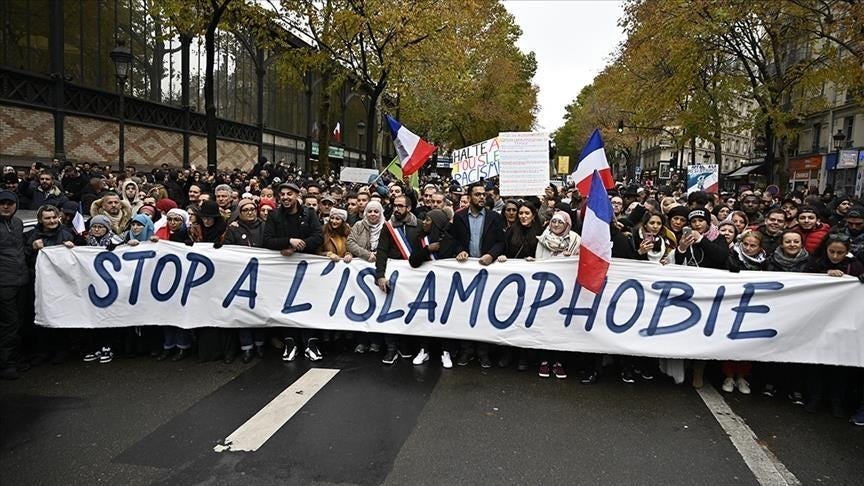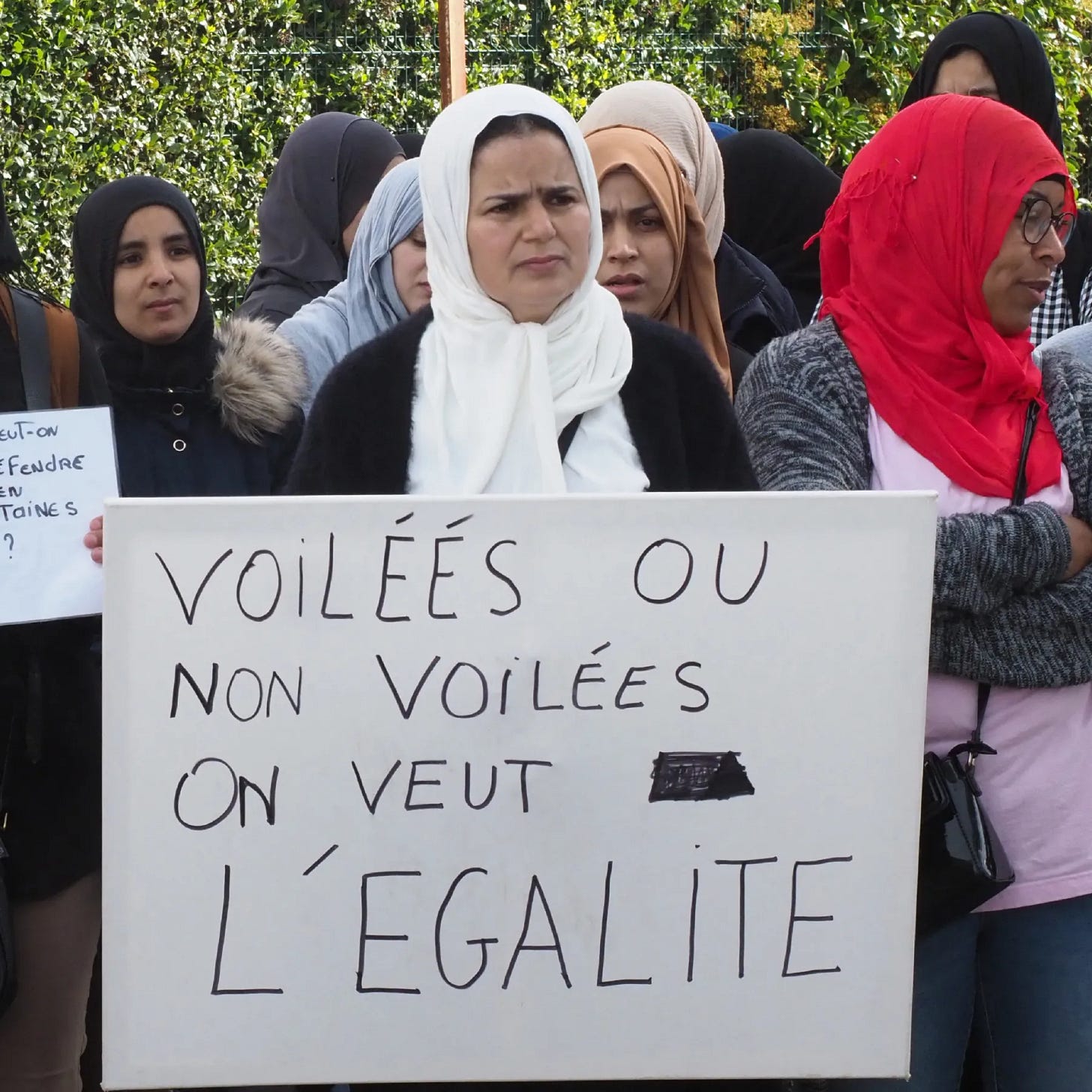Amid rising tensions over issues of identity and religious diversity in France, President Emmanuel Macron’s party has proposed a ban on Muslim girls under the age of 15 wearing the hijab in public spaces. The move is being justified as a measure to protect the "national fabric" from the influence of so-called “political Islam,” which is increasingly portrayed as a direct threat to the values of the Fifth Republic.
Since taking office, Emmanuel Macron has positioned himself as a bulwark against the rise of the far right. Yet over time, the distinctions between Macron’s stance and that of far-right leader Marine Le Pen have grown increasingly blurred. On issues related to identity and Islam, Macron has often employed rhetoric saturated with security and cultural biases.
The Myth of “Religious Neutrality”
The proposed ban on the hijab for minors is the latest step in a long legislative trajectory in France aimed at restricting religious expression in public spaces. This path began with the 2004 law banning conspicuous religious symbols in public schools, followed by the 2011 ban on the face veil in public areas, culminating in the 2021 law to uphold the principles of the Republic.
That law, introduced under Prime Minister Jean Castex and dubbed the “anti-separatism law” in the media, tightened oversight of religious associations and restricted homeschooling. It explicitly targeted “political Islam,” drawing praise from some quarters for promoting national unity, while others condemned it as a violation of religious freedom, the right to association, and parental choice in education.
It remains one of the most contentious laws in the fraught relationship between the French state and its Muslim population.
Continuing in the same securitized direction, the Ministry of Education in September 2023 banned girls from wearing abayas and long tunics in public schools, citing the 2004 law. The Council of State upheld the ban, stating it did not infringe on fundamental freedoms or discriminate against specific groups.
However, civil rights organizations such as Action for Muslims and other advocacy groups criticized the decision as unjust and potentially discriminatory based on religion and gender.
Although the ban is officially framed as a defense of secularism, security concerns also played a role. The government argued that abayas could be used to conceal radical materials in classrooms.
Yet education and legal experts dismissed this reasoning as exaggerated and lacking in empirical evidence—particularly after a government report showed that school neutrality violations jumped from 617 in 2021 to 1,984 in 2022, most linked to the wearing of abayas.
The Politics of Polarization
Macron’s Renaissance party, founded in 2016, initially avoided explicit antagonism toward Muslims and positioned itself as a progressive alternative to the traditional right-left divide. Today, however, it appears increasingly aligned with far-right rhetoric.
The party’s proposal to ban the hijab for girls under 15 in public spaces—including streets, cafés, parks, and shops—comes as political momentum builds ahead of upcoming elections.
This rhetoric reduces Islam to its visible symbols and automatically associates it with imagined security and societal threats. In this context, even a headscarf worn by a child becomes a political liability, prompting legal prohibition in the name of protecting minors and safeguarding public neutrality.
Macron’s party now seems willing to sacrifice its founding principles in pursuit of electoral gains, courting a right-wing electorate eager for a tough stance on Islam—even if it comes at the expense of individual and religious freedoms enshrined in the French Constitution.
This shared security-oriented cultural discourse between the traditional right and the ruling party marks a strategic shift with short-term electoral rewards but long-term risks. Instrumentalizing societal fear of “political Islam” as a campaign tool entrenches religious hostility as a central tenet of republican politics—reproducing the very polarization Paris claims to oppose.
The Republic’s Double Standard
Although the French Republic is built on the ideals of liberty, equality, and fraternity, government data reveal a dissonance between official rhetoric and ground-level practices, which remain steeped in security-driven and religious stereotypes.
The 2023 report by France’s National Consultative Commission on Human Rights found that Muslims are among the least accepted minorities in the country, routinely subjected to generalized negative assumptions that disregard their diversity.
According to the report, acceptance of Muslims stood at just 57 out of 100 points. Tolerance scores were slightly higher for Black communities (77), Jews (68), and significantly lower for the Roma (42). Particularly troubling is the growing perception of Muslims as an “outsider group,” with 35% of respondents saying Muslims do not belong to the national fabric.
Moreover, 42% of Muslims in France have experienced some form of religious discrimination at least once in their lives—ranging from invasive security checks (13%) to employment rejection (17%) and housing difficulties (14%).
The impact is especially severe for women who wear the hijab, with 60% reporting discrimination, compared to 44% among their non-veiled counterparts, according to a 2019 survey.
On a psychological and social level, a 2024 survey by the European Union Agency for Fundamental Rights found that Muslim youth in France face daily verbal harassment and, at times, online stalking. This has correlated with higher rates of anxiety and depression compared to non-Muslims.
More than half (55%) of those subjected to racist violence suffer from mental health issues such as depression or anxiety. Alarmingly, one in five victims said they fear leaving their homes or visiting public places after such incidents.
France has yet to develop effective mechanisms to prevent religion-based discrimination. Instead, it has enacted laws that are formally neutral but symbolically target Islamic expressions.
For instance, bans on abayas and face veils lack standardized enforcement mechanisms, leading to inconsistent practices across municipalities and leaving wide discretion to security and cultural authorities—disproportionately affecting Muslims.
In this complex and fraught environment, Muslim communities in France continue to raise their voices through civil society organizations and advisory bodies like the French Council of the Muslim Faith, Action for Muslims, and the French Islamic Cultural Association.
These groups call for a form of secularism that respects religious diversity rather than marginalizing it, and advocate for integrating Muslim history into national curricula from a human rights and historical perspective to dismantle entrenched stereotypes.




